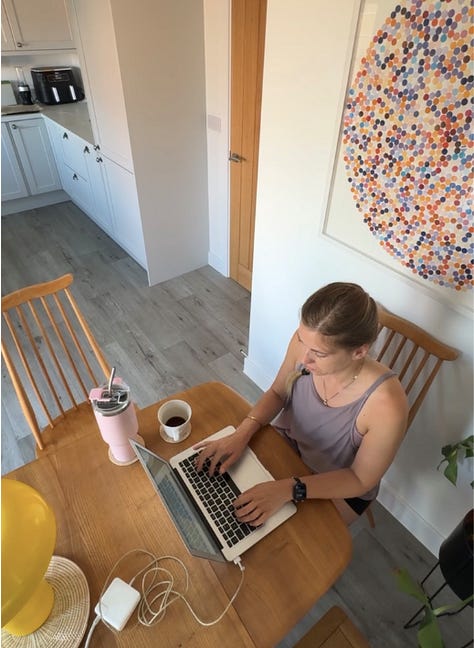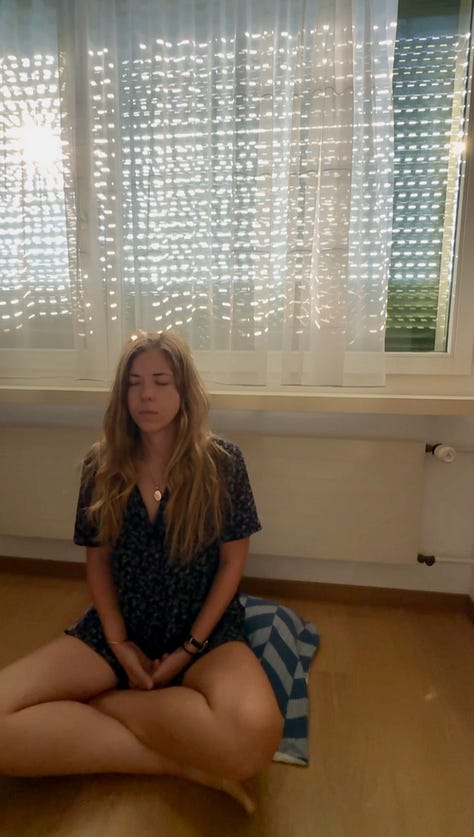On embracing (very) messy consistency & habits
TLDR: You don’t need to be perfect, but being consistent will help a lot …
👋🏼Welcome! If you’re new here, the TLDR version is this: I quit drinking in December 2016. Since then I’ve quit my corporate job (three times), trained as a yoga teacher and coach, moved out of London to the countryside, to Cambodia and (eventually) back again. Over the years, I’ve worked with thousands of women to help them stop drinking and thrive alcohol-free. And now? I’m asking new questions. What comes next? What comes after the big changes? What does life look like when you’re on your fourth personal rebrand within a decade? After you get sober? After you leave the job you hate? After you move counties, countries, and then back “home” again? After you chase long-held dreams and build something of your own? After you go back to full-time corporate work - only to quit everything all over again? I started writing a blog in early sobriety called Girl & Tonic. Now, I’m here with Girl 2.0. I don’t have all the answers - but I do have lots of questions. And I’m here to explore them as I rebrand (again) and bring you on the journey with me so that we can - hopefully - navigate happier, more fulfilled lives together. I’m 34 and living alone with my miniature sausage dog Margot. That’s me - now you’re up to speed and it’s lovely to have you here x
For the first time in a long time, I’ve managed to stick to some daily(ish) habits: meditation, gratitude, writing. And weekly habits: running, gym, yoga. And it’s improved my life experience A LOT. So much has happened in the last year, and it’s been a masterclass in the importance of shifting my focus from external – worrying about how I’m perceived, my career, ticking the boxes of expectations for a woman in her 30s – to being way more bothered about my internal experience. I want to live a life that feels good, not one that looks good to other people but feels exhausting. A life I don’t need a holiday from, so that I can enjoy my holidays. (Because I love a holiday).



I’ve stuck to sobriety before (as I’m sure you know if you’re reading this), 8 years, 7 months as I write. But alcohol-free life is the only thing I think I’ve ever managed to do consistently – until this year. I ran for a bit in 2015. I wrote a blog semi-consistently for a few years. I did a lot of yoga for a while, and now I am trying to do more again. But doing things every day always seemed beyond me. This is not a brag. Not even a humble one. I’ve always wished I could be one of those people who has a set routine and stick to it.
I used to berate myself for it. A moral failing. Why couldn’t I be a person who stuck to a routine when everyone else seemed to find it easy? Why couldn’t I do the things I wanted to do? Well, it turns out I can – but I needed to do it differently. If the definition of insanity is doing the same thing over and over and expecting a different result, my approach to trying to get myself to stick to habits was insane. Every Sunday, I’d tell myself this week would be different. I’d sit down and write a new plan for everything I was going to do. The plan would look a lot like last week’s plan, the one I had been unable to stick to. And then I’d have a go at myself for not doing it. Again. This routine has gone on ever since I learnt about self-development when I read The Miracle Morning in 2015, and failed to stick to the 5 am wake-up for more than a month.
I don’t need to tell you about the power of habits. We’re bombarded with that stuff daily. If your social media feeds look anything like mine, it’s shouting at you: IT’S EASY TO DO. THE. THING. JUST BUY MY PROGRAMME/ CHALLENGE/ DOWNLOAD MY APP.
As it happens, I don’t have anything to sell you. But if you also struggle with making things stick and having a routine, I’ve got some strategies and notes that have helped me push through the inconsistency and finally get my habits to stick (almost) daily.
PULLING TOWARDS
Building a life I don’t want to escape from has become my modus operandi. I’ve been focused on building new routines, habits, ways of living that enable me to have energy, to not feel exhausted, to enjoy my daily life, to minimise the overthinking and anxious narrative that had become familiar territory. And, because it’s not enough of a challenge as it is, I want all of this not to feel like too much effort. Last year, in a revenge-procrastination doom-scrolling vortex (midnight, after a six-hour commute and a 12-hour work day), I read a quote that made me stop the scroll. It said: a happy life is just a string of happy moments. But most people don’t allow the happy moment, because they’re so busy trying to get a happy life.
I realised I was missing the happy moments in my pursuit of a happy life. I was living for the weekend, living for the next holiday, and it began to feel like a waste of my life. Fast forward to now, and I’ve realised what I thought would make a happy life (for me) was off. I was putting too much focus on things that looked good to other people, but didn’t give me a huge amount of meaning and left me depleted. What were the happy moments I could pay attention to without changing anything? And what happy moments did I want more of?
I have more happy moments when I meditate, when I’m calm, when I take the time to reflect on what’s good and when I write my gratitudes. These have become foundational habits that pull me towards a happier life. It’s become easier to stick to them when I focus on what they’re pulling me towards (a happy life) rather than feeling like I have to do them because I’m running away from what I don’t want (the foundations of pull motivation vs push motivation). Some people are motivated by push motivation, by the stick, by beating themselves up – I’m not. I’ve spent enough of my life being mean to myself, bullying myself into doing stuff. This way works better for me. Focusing on what I want more of, and the habits being building blocks pulling me towards a happier life experience.
MESSY CONSISTENCY & DAILY-ISH
When I set out on a Sunday night to change my life! and committed to a new routine with the best of intentions and a detailed plan in my notes app, only to give it all up by Wednesday (after a couple of long workdays, one thing not going to plan and a day of missed habits), I felt like I failed. Back to the drawing board I’d go and back to living how I always had, until a new week rolled around and it was time to start a new plan. I didn’t allow myself grace or flexibility, and the outcome was nothing stuck. I felt a little bit worse with every “failed” week, my self-belief chipped with each missed habit, and the (false) evidence mounting that I couldn’t do it. When we’re raised to chase perfection, to get full marks at school, and fed versions of consistency that would be more suited to robots than a fallible human, I don’t think it’s surprising that this was my reaction to a missed day. But it wasn’t helpful. I was a human trying to live like a machine. Optimised routine. Optimised schedule. No room for error, for hormones, for mess, for life!
This year, I finally embraced my humanity and with it the permission slip of messy consistency. Instead of “daily”, I set my habits as “daily-ish”. In January, I wrote out a list of habits I wanted to stick to (I’ve written some of them above already) but there were a few more:
Dailyish
- Meditate
- Gratitudes
- Write
- Take creatine
- Take collagen
- Red light therapy
Weekly
- Run x 3
- Gym x 2
- Social plans
- Sauna
I know common advice is to only introduce one thing at a time, but doing it all at once – and accepting that I won’t do it sometimes has worked better for me this time. It’s all stuff I want to do, not stuff I have to do. (Context: child free, live alone, limited family responsibilities, one low-maintenance dog). My health (physically and mentally) is better when I move, and that’s why it’s so dominant in my weekly priorities. Yours will look different.
The daily-ish mindset is helpful for me. It takes the pressure off. If I don’t do a habit, I don’t rip up the plan and start over, I just do it the next day (or the day after that). This week, I hadn’t meditated until last night, even though it is one of my daily-ish habits. I’ve had house guests, didn’t get much sleep one night and was a bit out of routine. Rather than beating myself up and saying “you didn’t do it, you suck at meditating, you’re a flakey person,” I noticed I missed the habit. I’ve felt more frazzled and less calm. Without the stick beating me, I am pulled towards doing it again. Originally, I noticed this and said to myself, “I’ll meditate tomorrow morning,” then a little voice said, why not now? So I did. Last night at 11 pm before bed. Building in the ish, mental flexibility, has made it all so much easier to stick to.
Messy consistency beats perfection, because messy consistency is realistic and perfection is a standard that is impossible to reach.
STICK TO THE PLAN, NOT YOUR MOOD
Daily-ish habits have supported my habits, knowing I don’t need to start over with every missed day. But because life isn’t black and white, I also try not to miss days. Multiple strategies have helped me to move forward, and whilst this opposes daily-ish, I think two things can be true at the same time. Stick to the plan, not your mood, has helped me stick to my habits more. I get major decision fatigue. Every habit used to become a negotiation. Shall I do it today? Shall I skip it? I don’t feel like it, so I can do it tomorrow instead. I do still do this sometimes. But I have shifted to following my plan as much as possible, if I can’t make it work – I don’t – but if I can, I try to. If I’m injured, if I am unwell, if there is a crisis, I can adapt. But if I just don’t feel like it, I’ll say to myself: stick to the plan, not your mood. Most of the time, this is enough to help me do the thing.
(And if you’ve been reading any of this and relating any of this towards getting sober, or stopping something, this is the advice to hold on to. Read some stuff around addictive voice recognition and learn to recognise your moods that whisper just one won’t hurt, or I’ll start again tomorrow as voices trying to persuade you away from what is in your best interest.) There’s a difference between compassion and neurological brain junk committed to keeping you comfortable. Distinguishing between the two helps us live happier lives.
UNDERSTANDING THE MOAT OF LOW STATUS
Humans don’t like being bad at stuff. We resist it. Or maybe I should be more specific and say, I resist it. I don’t know about you. But I hate not being good. I notice in myself I’d rather not do the thing, than do the thing and be bad at it to begin with. This doesn’t just apply to work, or major projects, I find it applies to my everyday life. It shows up in my habits. I don’t want to be bad at meditation, so I won’t meditate. I don’t want my writing to be bad, so I won’t write. I don’t want to be a slow runner, so I won’t run. Even though doing the thing (and showing up with messy consistency) is what gives me a chance of being good.
I’ve recognised this pattern in myself and my life many times over, but recently I saw it described as “the moat of low status” by Kate Hall on Substack. She says that anytime you're doing something new, trying to acquire a new skill, you're not going to be good at it. And for that reason, many people don’t do it. This is what she calls the moat of low status, and you can make a choice between the hypothetical of wanting to be good but not doing the thing because you’re scared of not being good, or the reality of starting, embracing being a beginner, doing the work consistently, and (hopefully) becoming good.
“Fear of being temporarily low in social status stops human beings from living richer lives to an unbelievable degree.”
There aren’t any shortcuts or hacks to becoming good; you have to get in the moat, then through it and keep swimming to get to where you want to be. Recognising the moat as being the thing that is holding you back, building the awareness of your resistance and then learning to love the moat, to love the process of showing up, lowering your expectations to “show up” rather than “be good” can help you stay on the path of doing what you say you’re going to do. Or it’s helped me at least.
*
A closing thought (because I didn’t mean for this to reach 2000 words, but it turns out I had a lot to say) … you don’t owe anyone a version of you that no longer feels true. You’re allowed to make changes and do things differently. You don’t need to wait until Monday, for a new month, or the new year. A random Thursday in July is as good a time as ever to recognise something isn’t working. Or that there is room for more. Tiny shifts can have a massive impact on your life experience. Don’t underestimate the impact one new habit can make. If you’ve been reading this with a new habit in your mind, I encourage you to commit to it (tell me what it is in the comments). Commit to a daily-ish practice, to sticking with the plan and not your mood, to embracing messy consistency and to swimming through the moat on your way to a happier life. Because you deserve a happy life (and so do I).
Love,
Laurie (2.0) x



Thanks for these words of wisdom, Laurie. They really hit home with me. “Stick to the plan, not your mood.” Brilliant.
Nice post, 2000 words and all. I just retired and am trying to enjoy it without turning it into a chore. (E.g., that I have piles of books to read doesn't mean I need to commit to a minimum of X pages per day else face waves of self-reproach.) Thanks for the advice!